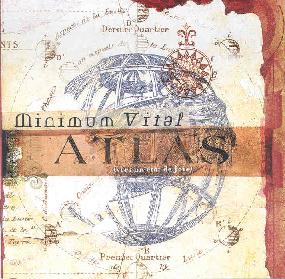 Minimum Vital - "Atlas"
Minimum Vital - "Atlas"
(Musea Records 2004, FGBG 4533-AR)
 Minimum Vital - "Atlas"
Minimum Vital - "Atlas"
(Musea Records 2004, FGBG 4533-AR)
Uploaded to Aural Innovations: April 2004
My first experience with Minimum Vital was about a decade ago when I first heard Sarabandes, an electrifying example of the kind of elegant grandeur this vastly underrated “frog prog” group can generate. Having been together now for nearly 20 years, Minimum Vital has completely evolved its own distinctive style, merging European progressive rock (Renaissance, Genesis, Jethro Tull) and jazz-rock with the ornate mannerism of late medieval and early Renaissance music. And while the group’s earlier albums (particularly the aforementioned Sarabandes as well as La Source) may be somewhat more adventurous, Atlas still packs a potent punch, especially with such gems as “Saltarello” and the title cut. As with most prog bands, Minimum Vital combine a preference for compound time signatures and complex chordal structures. One thing however that separates MV from other similar outfits is the distinctive use of two lead vocalists (Jean-Baptiste Ferracci and Sonia Nedelec) and a penchant for simple yet striking melodic interventions (usually courtesy of guitarist/mandolinist Jean-Luc Paysson and keyboardist Thierry Paysson). Add to this the precision rhythm section of Didier Ottaviani and Eric Hebeyrol, and it’s easy to see why Minimum Vital has become one of France’s finest and longest lived progressive rock bands. There’s hardly a song on Atlas that’s not worth mentioning, from the punchy “La Ribote,” with some astonishing keyboard work to the beautiful tour de force “Icarus.” Here the vocals of Ferracci and Nedelec soar like velvet birds over some stunning guitar/organ interplay, very reminiscent in feel and texture to Genesis’ art rock masterpiece Selling England by the Pound, though naturally imbued with the characteristic romanticism of which only the French are capable. The pinpoint guitar soloing of Jean-Luc Paysson on “Icarus” is a moment of sublime transcendence. “Saltarello” is an arresting mix of art rock structure with late French Renaissance folk melodies; the up-tempo triple times feel and complicated vocal harmonies are simply addictive. “Louez Son Nom!” continues the fusion of ancient and ultramodern styles, while adding some almost Magma-esque operatic vocalizing ala Klaus Blasquiz. As always, Musea’s packaging (a 28 page insert booklet full of 16th century geographical maps and nautical manuscripts) is first rate, an equal match to the consummate musicianship one has come to expect from Minimum Vital.
For more information you can visit the Musea Records web site at: http://www.musearecords.com.
Reviewed by Charles Van de Kree